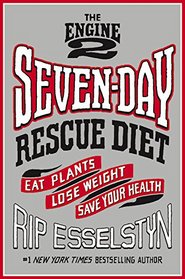Alice B. reviewed The Engine 2 Seven-Day Rescue Diet: Eat Plants, Lose Weight, Save Your Health on + 3634 more book reviews
I've been vegan for almost four years and have a small collection of plant-based nutrition books and cookbooks, but had never bought an Engine 2 book before. I picked this up at a friend's suggestion (she had told me about the free Facebook support group) and because I had seen some of the recipes in the daily emails the Engine 2 group sent, and am so glad I did. If you're new to plant-based eating, there is a lot to learn here, but even if you're been vegan for awhile, this has really good advice for moving to a whole-foods diet, and the recipes are tasty and easy!
If you decide to follow the seven-day plan, you won't be eating dairy, eggs, meat, or any oils (including oil and coconut oils) or drinking any alcohol, and you'll be limiting your fats to just walnuts, small amounts of avocados, and the fats that exist naturally in plant foods. You're also meant to minimize your salt and sugar intakes.
The recipes are based on the foundation of building oatmeal-based bowls or waffles for breakfast, and then bowls, soups, or open-faced sandwiches for lunch and dinner. Since one of the rules is to not drink your calories, there are no smoothie or juice recipes.
Part I of the book (which comprises the first 176 pages) is where the author outlines the programs, and he draws upon the latest studies to explain why a plant-based diet is so healthy. He takes the time to de-bunk the myths that you can't get enough calcium or protein from plants. Although I knew most of this information, it was a helpful review, and if you're new to plant-based eating, I think that the information can help alleviate any worries you might have about meeting your nutritional needs from plants.
Part II (pages 177-279) contains a more detailed overview of what you can eat during the seven days, as well as quite a few recipes to get you started. So far, all of the recipes I've tried have been great -- and they are so easy to put together.
If you decide to follow the seven-day plan, you won't be eating dairy, eggs, meat, or any oils (including oil and coconut oils) or drinking any alcohol, and you'll be limiting your fats to just walnuts, small amounts of avocados, and the fats that exist naturally in plant foods. You're also meant to minimize your salt and sugar intakes.
The recipes are based on the foundation of building oatmeal-based bowls or waffles for breakfast, and then bowls, soups, or open-faced sandwiches for lunch and dinner. Since one of the rules is to not drink your calories, there are no smoothie or juice recipes.
Part I of the book (which comprises the first 176 pages) is where the author outlines the programs, and he draws upon the latest studies to explain why a plant-based diet is so healthy. He takes the time to de-bunk the myths that you can't get enough calcium or protein from plants. Although I knew most of this information, it was a helpful review, and if you're new to plant-based eating, I think that the information can help alleviate any worries you might have about meeting your nutritional needs from plants.
Part II (pages 177-279) contains a more detailed overview of what you can eat during the seven days, as well as quite a few recipes to get you started. So far, all of the recipes I've tried have been great -- and they are so easy to put together.




